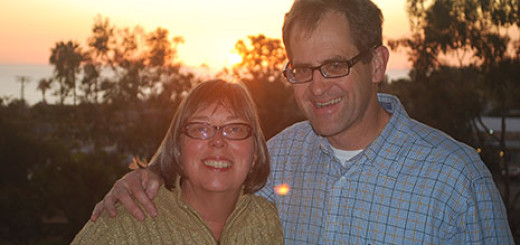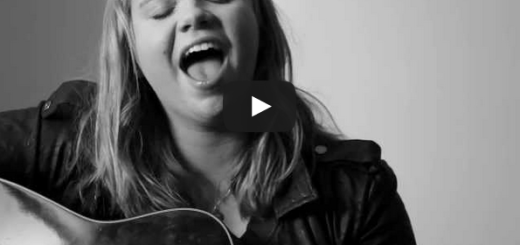World Alzheimer’s Month: A Look at Alzheimer’s Through Elena’s Eyes
 In celebration of World Alzheimer’s Month in September, we’re highlighting Alzheimer’s stories from around the world. Today’s story comes from a caregiver in Santiago, Chile – Elena Muñoz Iván’s. She writes a beautiful blog about her mother’s struggle with Alzheimer’s and about people’s perception of honesty and truth. You can read her original post in Spanish here: Corporacion Alzheimer Chile: A todos ustedes, admirables cuidadores, los que conozco a traves de mi papá y mi hermana.
In celebration of World Alzheimer’s Month in September, we’re highlighting Alzheimer’s stories from around the world. Today’s story comes from a caregiver in Santiago, Chile – Elena Muñoz Iván’s. She writes a beautiful blog about her mother’s struggle with Alzheimer’s and about people’s perception of honesty and truth. You can read her original post in Spanish here: Corporacion Alzheimer Chile: A todos ustedes, admirables cuidadores, los que conozco a traves de mi papá y mi hermana.
When I was a little girl, I was told about elves, guardian angels, Mr. and Mrs. Claus, fathers and mothers that were capable of protecting us from any danger and a heaven where grandparents, brothers, sisters and everyone whom we loved and “were good” went when they died. I remember two chicks that were given to me as a birthday gift that I made sleep near the Comet so they wouldn’t be cold and who died a few days later. My sister Elvira told me that they had also gone to heaven and that I should pray to them. I would pray to them every night, for a long time, with the certainty that they heard me. There also was a little mouse that took my teeth and left me money in return, and a horse that my grandfather promised to give me when I got older.
As I grew I began to notice that this fantasy world had created an infancy for me where I felt safer and where I could palliate fear until my psyche was more mature.
I profoundly thank my parents and my older siblings for giving me that parallel world, a world I recreated for my children and one I invoke every time life becomes difficult so as not to forget that in dreams, in tales and secrets also lives a version of the truth, because truth is not absolute.
My mother has Alzheimer’s and every time I walk next to her she takes my hand as if she was a little girl. I help her cross the street and go down stairs. We watch movies with happy endings and she helps me to sew in the same manner that I helped her when I was young and she was the adult. My mother has a notebook where the eldest of her grandchildren helps her write, paste cutouts, string words together and recall numbers. It is the notebook of a child. Probably the same type of notebook that her granddaughter kept when she was the granddaughter and my mother was the grandmother.
My mother’s memory reservoirs are becoming smaller, because children have few memories. My mother is a child in an older adult’s body, at the same time she is a woman that has to deal with a history that eludes her, with places in her own home that disorient her, with activities that she can no longer do but at times is capable of doing, with names and dates that become jumbled in her brain, with headaches and nightmares and with anguish that she cannot comprehend.
My father is her caregiver, faithful and tired. My father deals with her obsession, her repetition, her tantrums, her dependency, her fears, her nightmares, and her rebellion; but also has the privilege of being able to hug her every night, to not allow her to forgets his name, to hold her hands each time he dines next to her, and to share with her the largest amount of memories
My father is an oak tree, he still writes books, wins at pool, he gets around all of Santiago in the metro system, he makes gifts for his children with his own hands, reads in Spanish and English, and still accompanies/supports his friends as they age.
My father has always been an honest generous, kind and just man, and all his children carry those virtuous as our greatest inheritance.
This is why today, being the youngest of his daughters at 50 years old, I want convey to you with utmost certainty that my father is not a dishonest man because he tells my mother that he has a doctor’s appointment, when in reality he is going to meet with his publisher; that he is going to work, when in reality he is meeting with you; that he is joining his son-in-law to assist him with paper work, when in reality his son-in-law is accompanying him to his beloved Union Club reunions. He does not stop being honest by engaging in these activities. He continues to be generous and just with my mother and with himself.
My father is an oak tree that needs his branches to be flexible so that the storms do not break him so easily.
The lies that you all see on a daily basis are the truest act of mercy and love.
Millions of lives have been saved thanks to lies in periods of wars and totalitarianism. Anne Frank, would perhaps still be alive if that neighbor had not told the truth that a family was hiding in the House.
The lies of all of us who have someone with Alzheimer’s disease in our families are simply a ways to overcome and minimize the pain of those suffering with the disease.
With my greatest of respect and profound admiration to all of you, Elena Muñoz Iván’s daughter and sister to Tita


















Here is my parents story about dealing with Alzheimers. I published it in Caring Connections a few years ago.
Caring Connections – August 6, 2000
Ronald R. Besel
Miracle, Unique Phenomena, or God’s Plan?
My father, Rev. Harold Besel, had a retirement dream. He wanted to write a book for others serving as hospital chaplains. After 15 years in the parish ministry, he had discovered that his true calling was ministering to the sick and the dying in hospitals, nursing homes and mental heath institutions. Having spent over 25 years of interacting daily with people lying in hospital beds who were often scared, discouraged or spiritually lost, he felt that he had gained some insights on how to minister to their needs. Most of all, he didn’t really want to retire but to continue to serve a few nursing homes and preach on Sundays while he worked on his book.
But God had other plans. When Dad was 64 he was diagnosed with prostate cancer. Two rounds of surgery were followed a series of radiation treatments. After a brief recuperation period, Dad attempted to return to his normal duties of hospital chaplain as well as his administrative responsibilities as head of the Cleveland Lutheran Chaplaincy Services. Before long he had both a physical and mental relapse that required hospitalization. He never regained the strength to resume his full-time position but continued to serve several nursing homes for several years.
I was living in California at the time of Dad’s surgery. We had vacationed with Mom and Dad and my sister’s family just before his surgery and he had led us to believe that the surgery would be routine. He didn’t want us to come for his surgery – everything would be fine. I didn’t realize how much his health had declined until I spent two days in Cleveland about six months later. Dad seemed to be in good spirits but clearly didn’t show the mental or physical energy that he had always had. I recalled his dream of writing a book and it seemed to me that his experiences during the past six months of being that person in the hospital bed might be God’s way of preparing him to write a better book.
None of us realized it then, but Dad’s loss of energy and depression were probably the first signs that he was suffering from Alzheimer’s disease. There were so many other reasons that could account for his memory lapses and his decrease in ability to concentrate. Denial is also the natural first response for both the person with Alzheimer’s and his family. None of us wanted the diagnosis to be Alzheimer’s. For years we held out hope that the progressive mental deterioration that comes from Alzheimer’s would not happen. Dad seemed happy in retirement and he continued to enjoy golf, bowling, doing crossword puzzles, and listening to classical music and to every Cleveland Indians baseball game. As time went on, I came to the conclusion that Dad would never regain the mental concentration needed to write his book.
But gradually it became apparent that Dad was suffering the losses associated with Alzheimer’s disease. Dad stopped going to a nursing home he had served for years after he couldn’t remember how to get home. First he couldn’t find his car in the airport lot and then in the nearby strip mall. Dad had always been the life of the party at family gatherings. I noticed that he had become very quiet when there were several people in the room. One time when I visited he was very frustrated because he couldn’t follow the assembly directions for some gadget he had bought. From the way he expressed his frustration it was clear that he was very aware of his declining abilities – and quite angry.
Dad suffered another setback during September of 1987 when he lost the ability to find his favorite bowling alley. He was admitted to the Alzheimer’s Evaluation program at Lutheran Hospital and the testing confirmed the changes associated with Alzheimer’s. He never drove his car again. Mom, who had cared for him through previous illnesses, now became his full-time caregiver.
Mom and Dad celebrated their 50th wedding anniversary during November of 1988. At the celebration dinner attended by three generations of family and a number of fellow pastors, Dad was obviously happy but could not be drawn into the reminiscing. He could still carry on a conversation, but not when so many people were present. A little more than a year later, my sister, Connie, my wife, Priscilla, and I visited for a few days after Christmas, and it was apparent that Dad’s communication skills had further declined and he displayed many of the symptoms of clinical depression. Depression and Alzheimer’s often go together. We had to help Mom admit Dad first to a hospital and then a nursing home. Anti-depression medication had some positive effects and Dad was able to return home.
Mom tried for months to care for Dad at home. Both Home Heath Care and Day Care were tried in the hope that they would provide Mom with opportunities to get brief breaks from her constant caregiver responsibilities. Neither worked; Dad would not accept substitute caregivers. At times he was hostile to caregivers, including Mom. Finally, exhausted from the constant demands, Mom found a nearby nursing home that was approved for Alzheimer’s patients. Mom spent most of every day with Dad – playing games, reading the Bible and devotions and playing recorded music that Dad liked. After a few months she decided to try to care for Dad at home; several months later she was exhausted again and was forced to once again place Dad in a nursing home.
Years passed for Dad in the nursing home with Mom visiting faithfully every day. At first Dad walked all over the unit and tried to interact with others. He wanted to read but could not make sense of some of the words. Dad gradually lost the ability to play even simple games and carry on meaningful conversations. He stopped responding to his favorite classical music – it was too loud or confusing. However, he continued to sing along with recorded hymns that Mom played for him every day. The recorded hymns that were available were mostly gospel hymns like “Amazing Grace†and “The Old Rugged Cross.†We looked for but couldn’t find suitable recordings of Dad’s favorite Lutheran hymns.
Music therapists long ago discovered that many Alzheimer’s patients respond to music, but they generally advise that music popular when the person was a teen or young adult is most likely to elicit positive responses. For patients in the final stage of Alzheimer’s, tunes from the person’s childhood may be all that will elicit a response. We were surprised, but pleased that Dad responded to hymns that he learned during his 40’s when he served a home for the developmentally disabled. I believe that Dad responded so well to these hymns, after he stopped responding to other music and had lost all ability to communicate verbally, because this provided him a way to hear once again the gospel message and respond in praise to God.
During Dad’s last years Priscilla and I often discussed the quality of his life and I wondered why God did not call him home. But whenever I visited I would see Mom hold Dad’s hand as they sang hymns together and Dad would look at her and smile. I’m sure he was living for her as she faithfully lived out her marriage vows, and neither one wanted their journey together to end.
The last time I saw Dad, a few months before he died, he was less responsive than I had ever seen him. He gave no indication that he knew who I was. But when we played some of his favorite hymns he hummed along. When Mom said goodnight with her usual prayer and said, “I love youâ€, I had a feeling that it was our final goodbye.
Dad died on April 15, 1997. Mom recalls that he hummed one of his favorite hymns, “I am Contentâ€, the previous evening before she put him to bed. Pastor Prok gave a most appropriate message based on the 23 Psalm; the theme was “He knew his shepherdâ€.
Would other Christians with Alzheimer’s respond to favorite hymns as Dad did, or was this some kind of miracle or rare occurrence? I don’t think it was a miracle, and it shouldn’t be a rare occurrence. God provides a way, even for a person who seems to have lost everything, to respond to his love and sing his praises.
Thanks for sharing your experiences to us. Thumbs up for sharing.
Thanks for this post. I found it with a Google search on “fantasy world Alzheimer’s” in my quest to know how to communicate with my mom when she is certain that her brothers were just here with us, that she has a job, that her mother wants to know we are going out or that we should call her mother if our plans change, or that her clothes in her closet are not hers…
I struggle because I do not want to lie to her and I fear that if I go along with her story that It might lead to a quagmire.
If I was just visiting for a day, it might be easier to just go along, but I live with my mom. When she says her toothbrush is not hers, I can get a new toothbrush, no problem, but she is constantly asking me questions like where is Jesse, where is Mama, when are we picking the children up from school, where did the boys go…
It would be great to find more examples of how validation therapy has worked for people, examples of dialogues that have been successful, lots of examples of deflecting and redirecting. The concepts are great and I just want to get better at communicating so there is ease for my mom and for me.
Thanks again for the great post.